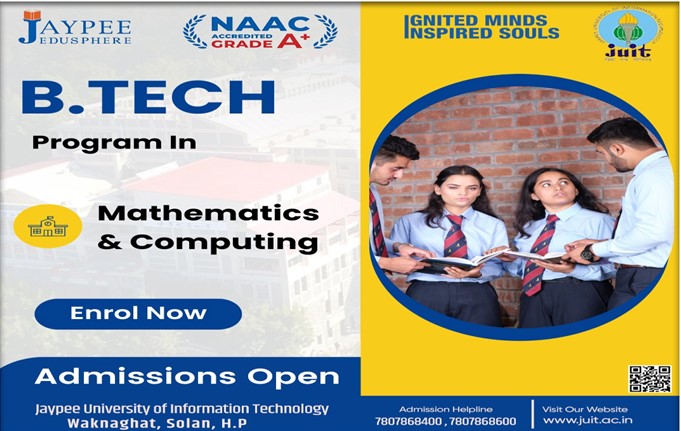The B. Tech. (Maths & Computing) Program is offered at JUIT jointly by the Department of Mathematics and Department of Computer Science and Engineering. The students joining B. Tech. Program are required to earn required credits through course work and dissertation distributed over 4 years to complete the Program.
Mathematics is an essential scientific tool in computing, in transforming abstract quantities and modeling real-world solutions. Computing, on the other hand, is rapidly being used to solve mathematical problems in an efficient and automated manner. Because of the widespread use of computers and computer-assisted technologies, graduates with strong backgrounds in mathematics and computing are in high demand in the corporate sector. Keeping the importance of mathematics and computer science in science and engineering, B.Tech. in Mathematics & Computing is introduced. The program not only aims to provide in-depth theoretical basis in mathematics and practical training in computer science, but it also covers a variety of multidisciplinary topics such as financial engineering, numerical computing, and intelligent machines. Graduates of the program will be well prepared for advanced degrees and careers in a wide range of industrial disciplines. The curriculum is developed in such a way that this degree is ideal for students who want to combine strong mathematical and analytical components with an emphasis on artificial intelligence.
Features of the Program:
PEO-1: To impart basic and advance knowledge in various domains of Mathematical and Computer Science.
PEO-2: To impart the computational and software skills to cater the needs of industries and research.
PEO-3: To inculcate team work with ethics to solve scientific problems using multidisciplinary approaches.
PSO1: To apply the theoretical and fundamental concepts of Mathematics and Computer Science computer in analysis, design and development of computing systems and interdisciplinary applications.
PSO2: To apply the mathematical and statistical approaches for analyzing, designing and development of computing systems in interdisciplinary applications.
PSO3: To work as a socially responsible professional by applying techniques, skills, and tools to solve real-world problems.
PSO4: To be competent in taking own decision in the expansion and acknowledgment of the knowledge and to gain the aptitude so as to engage in post graduate education and persistent learning.
PO1 Mathematical knowledge: Apply the knowledge of mathematics and computer science fundamentals to the solution of complex engineering problems.
PO2 Problem analysis: identify, formulate, review research literature, and analyze complex engineering problems reaching substantiated conclusions using first principles of mathematics, natural sciences, and engineering sciences.
PO3 Design/development of solutions: Design solutions for complex engineering problems and design system components or processes that meet the specified needs with appropriate consideration for the public health and safety, and the cultural, societal, and environmental considerations.
PO4 Conduct investigations of complex problems: Use research-based knowledge and research methods including design of experiments, analysis and interpretation of data, and synthesis of the information to provide valid conclusions.
PO5 Modern tool usage: Create, select, and apply appropriate techniques, resources, and modern engineering and IT tools including prediction and modelling to complex engineering activities with an understanding of the limitations.
PO6 The engineer and society: Apply reasoning informed by the contextual knowledge to assess societal, health, safety, legal and cultural issues and the consequent responsibilities relevant to the professional engineering practice.
PO7 Environment and sustainability: Understand the impact of the professional engineering solutions in societal and environmental contexts, and demonstrate the knowledge of, and need for sustainable development.
PO8 Ethics: Apply ethical principles and commit to professional ethics and responsibilities and norms of the engineering practice.
PO9 Individual and team work: Function effectively as an individual, and as a member or leader in diverse teams, and in multidisciplinary settings.
PO10 Communication: Communicate effectively on complex engineering activities with the engineering community and with society at large, such as, being able to comprehend and write effective reports and design documentation, make effective presentations, and give and receive clear instructions.
PO11 Project management and finance: Demonstrate knowledge and understanding of the engineering and management principles and apply these to one’s own work, as a member and leader in a team, to manage projects and in multidisciplinary environments.
PO12 Life-long learning: Recognize the need for, and have the preparation and ability to engage in independent and life-long learning in the broadest context of technological change.
